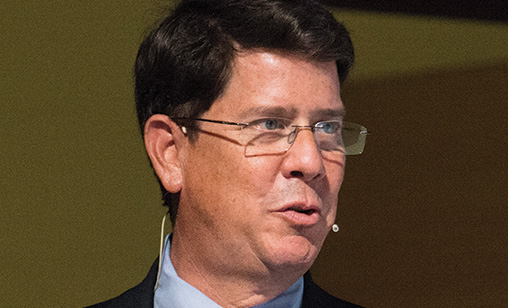Industry Insight: Innovation in Global Aerospace
Digital passports to make airport security obsolete?
July 1st 2016
Borderless travel in the blink of an eye is on the technological horizon for the world’s airlines. But its advocates must convince governments that biometric recognition systems are foolproof – and that will take time. Read More »
One promising development is Blockchain. If fully developed, it could revolutionise the airport travel experience. The forecast impact of the technology is the subject of research at the world’s leading internet companies and technology conglomerates such as aviation communications provider, SITA.
 |
| SITA chief technology officer, Jim Peters: developing system for seamless digital passenger clearance |
In its purest form, Blockchain adopters would have their passports embedded in their smart phones or wearable devices, allowing secure, biometric authentication in their journeys across borders, thereby eliminating the need for multiple travel documents or storage of passenger details by various authorities.
Speaking at SITA’s recent annual IT Aviation Summit in Barcelona , the company’s chief technology officer, Jim Peters, said SITA envisages a time when seamless, secure travel would be available to all airline passengers. “To date, technology has provided SITA with the opportunity to do this at many airports and more than 30 of the world’s borders,” he said.
“But the underlying design of today’s computer systems means there are multiple exchanges of data between various agencies and multiple verification steps in the process that reduces the ability to operate a single global system. Blockchain would make these processes obsolete.
Peters said it may be ten or twenty years away, but it would allow airlines to establish the true identities of all their passengers. At a summit session, the managing director of UK-based of Augmentiq, Matthew Finn, told delegates Europe had issued more than six million travel documents last year and that possibly more than 650,000 of them were provided to potentially false identities.
“These are genuine documents so frontline airline staff will not be able to identify them as counterfeit because they are not. They have been issued to people who do not exist,” he said. “People can create a new identity, obtain a birth certificate and then fraudulently obtain a genuine [travel] document.”
Finn said International Civil Aviation Organization (ICAO) statistics have identified a major shift from the use of counterfeit passports and visas to fraudulently obtained genuine documents. “Document fraud has been replaced by much more identity fraud. That’s the big issue we confront,” he said.
If it is adopted in the aviation industry, Blockchain adopters would create a verifiable “token” on their mobile phone or wearable device that contains their biometric and other personal data. In this vision of future travel, an airline passenger could travel worldwide and any authority could scan your face and your device to verify you are the person you say you are.
“Blockchain fundamentally changes the systems that create decentralized, global, tamper-proof, distributed databases. It is very early days yet and the issues of scalability and adoption rates need to be examined,” said Peters. He added that the concept “looks as if it’s got legs’.
“There has to be a pitch to governments that it would improve security. The proof points will have to be demonstrated. There has to be a business case for all stakeholders and that is cost,” he said.
Francesco Violante, retiring chief executive of SITA, said: “Knowing that passengers prefer to use their own devices and self-service technology throughout the journey should encourage airlines, airports and governments to examine methods to transform the experience at security, border control and baggage collection.”
Peters forecast: “The airline industry will not invent this. The financial industries, Amazon, Microsoft, all of these guys who create devices that are driving e-commerce, they want this too. They want better security and they want better experiences.
“They want to eliminate your 95 user IDs and passwords on line. They want to look at your device, have it recognize you and allow you to do transactions, use your credit card etc. We are looking to piggy back on these industries to see how these things develop.”
“Blockchain is a database where transactions are recorded and confirmed anonymously. Whether it is used for currency or travel it is a record of events that is shared between multiple parties, but once information is entered into its system, it cannot be changed and privacy and security are by design.
“You can’t put individuals’ biometrics into a big database that hackers could go after. One of Blockchain’s objectives is to make sure an individual’s biometric information never leaves his or her phone or device. It verifies that the data on your phone or device has not been changed.”
| A third of all passengers rates security as their worst airport experience SITA 2016 Passenger IT Trends Survey indicated airline passengers are becoming so comfortable with technology that they are choosing to use it rather than interact with people. SITA said 85% of passengers reported a positive travel experience in this year’s survey compared with 80% last year. Noticeably, passengers are happier at the steps of the journey where they have more control in managing their trip. At booking, which they can do online using a mobile or through an agent, 93% of respondents had a positive experience,” the survey said. “Passengers experience the most negative emotions during the security screening, passport control and baggage collection steps of the journey, with dissatisfaction peaking to nearly one third of all individuals surveyed at security. These also are the steps with the least number of self-service technology options.” |